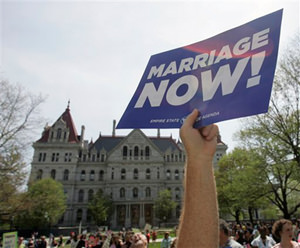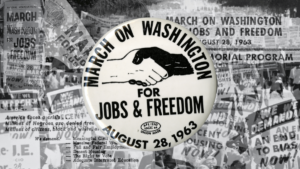Why We Won’t Wait
We won’t wait for the charity of corporate donors, or for the timelines of politicians. If such people care to donate funds or even to take the risk of civil disobedience, they are welcome to join us. On our own terms. But the time when gay people were grateful for small favors is over. We won’t wait for the charity of corporate donors, or for the timelines of politicians. The time when gay people were grateful for small favors is over.
False friends and regressive “progressives” are giving gay people bad advice. The mere fact that they are paying attention marks a degree of progress. Every movement for social change reaches a stage when it attracts the attention of social climbers, niche market advertisers and career politicians. In this respect the lesbian and gay movement is no exception. We face the classic problem of maintaining a vision of justice and community at a time when careerists of all sexual persuasions are keeping their eyes on the prize of corporate paychecks. Inevitably, newspaper editors deeply indebted to status quo politics have been giving editorial advice. An April 14 editorial in the Los Angeles Times typifies the usual messages delivered from the heights of congressional, corporate and editorial offices to the folks below:
“Too bad Proposition 8 won’t go away this year. Every day that lesbian and gay couples cannot marry is another day of discrimination against homosexuals, denying them the basic right to form families with equal stature to that of any other family. That said, we never thought 2010 was the best time for a new vote on Proposition 8. It’s too soon after the original, divisive election, and we worried about the potential for a costly, well-intentioned but ultimately unsuccessful effort.”
The editors at the Los Angeles Times are wearing 3-D glasses and watching their own neatly crafted home movie about social change. Thus they imagine they understand the real cast of characters in all their dimensions. This is an illusion. Position really is perspective, but they also lack a sense of irony. They fail to underscore the fact that the biggest blunders in the early media campaign against Prop. 8 were made by some of the biggest and best-funded gay organizations. These are the very organizations that are most entranced by corporate power and publicity. And the top-down strategies came from corporate boards of directors at groups such as the Human Rights Campaign (HRC), headquartered in multimillion-dollar real estate in Washington, D.C., and from Equality California (EQCA), whose executive director, Geoff Kors, has all the instincts of an advertiser rolling out the next big product.
The very groups that spent the biggest bucks on lousy TV ads are promising bigger and better TV ads the next time. In the first campaign, those ads came too late, nearly scrubbed actual gay couples from the picture, and were altogether too high-minded to have any practical traction on the ground. Now EQCA has hired more expensive publicity agents and claims to be cultivating the grass-roots communities of lesbian, gay, bisexual and transgender people. EQCA and Kors took immense heat from community activists, so they learned to make populist gestures while going on with business as usual.
The same boards of directors have come around again asking for donations for their next campaign, though their timeline for social change is tailored to the desires of Democratic Party apparatchiks and the biggest corporate donors. There is not an inch of daylight between the corporate boards of the wealthier gay organizations and the editors of the Los Angeles Times. I do not suggest any conspiracy. They all simply share a reflexive sense of class solidarity. So the message of the editors is not addressed to EQCA and HRC, but is rather meant to spell out the rules of the game to anyone who didn’t learn early lessons from playground bullies or from more paternalistic bosses in later life:
“The Proposition 8 campaign was particularly well funded on both sides, and the No on 8 forces shouldn’t wait to begin lining up contributors. Major donors opposing the measure indicated last year that they wanted to wait for the 2012 ballot. Corporate leaders who deplore the marriage ban are willing to give generously to defeat it, but they are not a source of limitless funds. Savvy business types, they expect a reasonable chance of seeing results for their money.”
For my money, the editors of a Titanic newspaper (sinking fast) are in no position to give a movement for justice any advice about what they call a “smarter strategy.” That strategy simply comes down to spending corporate dollars on a timeline that will not agitate career politicians. Look, if corporate donors want to give big bucks for social change, then community activists would be fools to turn them down. Sure, take the money and run. But let’s run in our own chosen directions, according to our own strategies and timelines. Otherwise, no deal. Otherwise that money comes with all too many corporate strings attached. Then, by default, we become corporate puppets, walking billboards and neon logos.
Speaking of “limitless funds,” the editors at the Times need a sharp reminder that corporate donations for social change are always highly calculated bets and often amount to spare change. If a handful of ethical community organizers got a fraction of the money spent on banking and corporate bailouts, that money would do more direct good than a thousand spare-change grants from a thousand corporate boards — because that fraction would amount to serious money, and because the “market value” of ethics has proved to be so low in recent years. Corporations know the market value of publicizing their own philanthropy. But a simple rhyme from William Blake will point up the problem with all charity from on high: “Pity would be no more / If we did not make somebody poor.” The main interest of corporations in any “sector of the market” (including gay people) is the fond hope that we, too, will become “good corporate citizens.” For many decent people, that is a paltry ambition. And for any democratic socialist that is no ambition at all.
Truth in advertising would require every organization in the business—and I do mean business—of corporate philanthropy to spell out in plain public print which strings are attached. But truth and advertising are barely acquainted, so there is a very high price whenever we allow corporate donors and governments to dictate the goals and timeline of any movement for social justice.
Let’s not be too finicky about money and power. Sure, everyone deserves a fair share. But there is a world of difference between a movement for justice growing from the ground of class-conscious communities and a movement of social-climbing entrepreneurs banking on new markets. Those two kinds of movements should be in dialogue, but they are also in conflict. Since corporate boards of directors are intensely class-conscious, simple justice dictates that working people have a right to class consciousness as well. When organizations claiming the legacy of the civil rights and social justice movements decide that the best way to fight corporate culture is to become corporations, the justification is always some version of the adage that you fight fire with fire. Well, sometimes you do and sometimes you don’t. Sometimes you fight fire with water, or by clearing dead wood away from your dwelling. The conflagration of our national economy is, however, not a natural disaster. This disaster was made in corporate casinos by gamblers who placed high bets using the hopes, wages and pensions of other people. They did not simply indulge in the more or less solitary vice of betting small sums out of private pockets. They were spinning the whole corporate Wheel of Fortune, and they became the biggest thieves in history. They were often cheered on in the boom years by wholly owned subsidiary players on editorial boards and in high office, before the whole spectacle went bust.
The editors at the Los Angeles Times are peculiarly unaware that their own ideology has any causal relation to the firestorm of our current economy and public life, and they may be quite surprised that the shelf life of the corporate nostrums they are peddling expired long ago. An old-fashioned devotion to news on paper (which I share) hardly requires any sentimental attachment to the hucksters of corporate civilization. In their own editorial realm, they collected tons of dry tinder and played with matches, and now the blaze is bearing down even upon newspaper offices. That is news fit to print, though not by editors at the Los Angeles Times.
Likewise, the moral and political horizon of those editors offers no clear view of the world at all. Proposition 8 was not simply an assault on the human rights of lesbian, gay and bisexual people. It was also an assault on the separation of church and state, heavily funded and promoted by fundamentalist groups, as well as by the Mormon and Catholic churches. It was thereby also an assault on secular values in public life and undermined the foundations of the republic. Who came to the defense of Dreyfus, a Jewish officer of the French army? Not the big businessmen of France, not the clerical reactionaries of that time, and not militarists with an ax to grind. No, the fighting camp of Dreyfusards consisted of radical republicans committed to secular equality. Those are historical lessons we should call back to public memory in these times.
Prop. 8 was not simply a legal move to enshrine the existing status quo. No, because there had been a brief period when the state of California affirmed the legal right of gay couples to marry in the same manner as any other couple. My husband and I chose to do so. Now we are left stranded as “exceptional cases” since Prop. 8 makes legal marriage impossible for other gay couples. Prop. 8 was a reversion to discrimination after a brief episode of legal equality, and the net effect is that painfully gained legal rights were stolen away. The political lesson is that the communities most at risk cannot count on politicians or corporate donors to defend their rights, not just in the seasons of progress but especially in seasons of reaction.
The editors of the Los Angeles Times say the early campaign against Prop. 8 was ineffectual. This is true, if we are looking only at the wealthiest and most bureaucratic groups. But from the beginning, other community groups took an independent path of open resistance. It is very telling that the editors of the L.A. Times note the ineffectuality of the early campaign but end up giving the very same bureaucratic advice to wait until the stars align in our favor. Or until kingdom come. They advise us, once again, to wait.
The time to fight injustice is always now. The “big donors” and politicians like to jump to the head of a parade once other people have taken the real personal risks of creating a social movement of resistance. A simple tribute to those who stepped forward without big bucks is therefore in order. I will mention only two among the many community groups that did so. Restore Equality 2010 did not agree with the “pragmatic” timeline and pressed to put Prop. 8 back on the (November 2010) ballot for defeat. Plainly it lost that effort, but it won the more important moral and communal battle. Likewise, Love Honor Cherish, a grass-roots community group that lacked the big budgets of more traditional groups, deserves great credit for daring to fight the good fight without any guarantee of winning the immediate legal or legislative battles. It set the high standard of not waiting for justice, and of building its campaign from a base of real communities. Love Honor Cherish understood that in a long social struggle we can expect to lose, to lose, to lose … and then to win.
No one can predict the ideal timeline of events, least of all career politicians. In real time, gay community members took the initiative and began conversations with friends and neighbors. They trained volunteers with strong ideals to gather signatures, whereas better-financed groups hire part-time labor to do that job. Their door-to-door campaign was not wasted. Truly, they tilled the soil and planted seeds that will bear fruit. They were not able to rack up the number of signatures needed to put Prop. 8 on the November ballot for repeal, but in every other way they covered themselves in glory.
Corporate liberals, unsurprisingly, give corporate advice. But even on the democratic left (generously defined to include people inside and outside the Democratic Party), there are some people who are now giving the most regressive advice possible. They like to flatter themselves by saying queers think only of their own small petty cause, while they themselves have their eyes on much wider horizons. We’ve heard all that before. Gay people recognize this as a more genteel form of anti-gay bigotry, sometimes dressed up in Marxist guise but more often encountered in the usual bogus pragmatism of the Democratic Party. Some of these “progressives”– yes, the word must be braced in cold iron quotation marks—even advise waiting beyond 2012. They, too, advise queers to wait in line behind their preferred agenda and timeline.
The old debate about marriage versus civil unions has become strictly academic. So let’s grant the most obvious point and the most secular premise up front: If we had divine powers and were making the world from scratch, no state would be in the business of regulating marriages at all but would simply attend to common justice and civil unions. The ceremonies that “sanctify” a marriage would be left strictly to personal faith, and to your local mosque, synagogue or church. Those marriages would have no special privileges and no higher standing in secular law. Fine. Let’s hope we agree on that much, but the practical battle divides even those who agree in principle with equality of kinship. And those are the words I do prefer to use—equality of kinship—not simply the “equal” right to marry. I must make this distinction because I am a gay socialist, and no honest social democrat will be content with marital laws that carve out a bunker of privilege for married couples. Will there be no justice and solidarity for single people or for people living in communal households? Equality of kinship is consistent with democracy and socialism, whereas an obsession with private households and marital privilege is in complete contradiction with basic social democracy. Try finding corporate donors and capitalist politicians willing to be consistent defenders of equality of kinship. You will be hunting for unicorns.
In the United States, this fight for equality does not begin on level ground but precisely with inherited institutions and history. We are now left with the tough work of disentangling church and state not only at the federal level, but closer to home at the state and local level. We are left, in short, with the usual trench warfare and with the usual enemies. This does not rule out civil conversations with all kinds of friends and strangers. But it does rule out taking marching orders from newspaper editors and politicians.
The argument has been made that California should follow the lead of states that grant civil unions to queers, thus bypassing the “culture wars” battle over the definition of marriage. But California already has a form of civil unions that covers many of the same legal rights granted automatically to traditional marriages. The problem extends, however, across state lines and also reaches to the realm of constitutional principles. Traditional marriages are granted “full faith and credit” across state lines, but the situation with same-sex civil unions is altogether murkier. The Defense of Marriage Act (DOMA), signed into federal law by President Bill Clinton after being passed by a large bipartisan majority in Congress, must be overturned. That law now stands as an immense obstacle to justice, a bipartisan monument of bigotry and discrimination that must be torn down. But it must remain a lasting lesson to every serious social democrat. At the level of federal law it undermines “full faith and credit” and denies same-sex couples married under state laws the scores of federal benefits that accrue to traditional marriages.
Overturning DOMA is among the explicit promises President Barack Obama made to gay people, and that has been duly postponed in the interest of bogus pragmatism. Some say Obama has bigger issues on his agenda, including fighting wars, reforming health care and lifting the economy. Anyone daring to make that case should notice that we were promised hope and change, but we are back to the old program of war and empire; that the health care bill is founded on quicksand, since it forces us to buy the same bad product from the same insurance companies; and that the economy has been placed back in the hands of thieves, banks and corporate royalty. Anyone making such an argument already dismisses and erases the many gay people who are soldiers, or who seek medical care, or who have lost jobs and homes along with their friends, families and neighbors.
Anyone who offers such excuses for career politicians may be serving the Democratic Party very well, but is serving simple democracy very poorly. For years to come the legal situation for gay people will be a haphazardly built shack rather than a public shelter. In this cold climate, we are told we are lucky to be given the castoff rags of charity, but even the rights we gain are subject to the outrageous veto power of volatile voters. Majoritarian referendums on basic human rights such as kinship and marriage do not occur simply because the far right has the most clever strategies and the biggest donors. On the contrary, these injustices are also the creation of every citizen who accepts the old brutal code of Realpolitik, a code which has long kept in power an unelected corporate government and two parties devoted to the crass amorality of the “free market.” Only in such a moral and political climate can we be so careful to protect the careers of politicians and so careless in defending social solidarity.
Civil unions for queers, and marriage for everyone else — that solution, too, is often proposed. And it may sound so practical and so simple. But this “solution” is also the very definition of first- and second-class citizens. This leads directly to enshrining principles of segregation once again in civil law, however genteel the excuses and the provisions may be.
Nor do civil unions, when proposed in this manner, achieve the aim of bypassing theological debates over the nature of marriage. That never happens, neither in the court of public opinion nor in courts of law. One pointed example will serve here, and it concerns a glossy, full-color broadside distributed to many thousands of homes in Los Angeles during the public battle over Proposition 8. The proponents of Prop. 8 quoted the words of Obama and Vice President Joe Biden on this ad. Obama was quoted saying “I’m not in favor of gay marriage” when interviewed by Chris Matthews of MSNBC on April 2, 2008. Obama was also quoted telling a candidates forum at Saddleback Church in Southern California on Aug. 16 of that year “that marriage is the union between a man and a woman. … Now, for me as a Christian, it’s also a sacred union. God’s in the mix.” Biden was quoted in the vice presidential debate of Nov. 2, 2008, saying, “Barack Obama nor I support from a civil side what constitutes marriage. We do not support that.” Biden was hardly eloquent or precise, but his meaning was construed by the proponents of Prop. 8 to suggest that even civil unions were opposed by Obama and Biden. The right wing did not bother noting that Obama had endorsed civil unions and opposed Prop 8, but was glad to pick up the other ammunition that the Democratic Party had left in easy reach. As often as Democrats try to bury such evidence, we must force these facts back into daylight. If they are ashamed, then they should stop their shameless appeals to religious bigotry. Agreeing to hold a major political forum at Saddleback Church was already a huge concession to the religious right, and Obama went right on to invite that church’s pastor, the Rev. Rick Warren, to deliver the invocation at his inaugural. After much protest, Obama also invited a gay priest to deliver a prayer at the Lincoln Memorial, but with much less limelight. Warren is a close colleague of right-wing evangelical politicians in Congress, some of whom have given aid and support to right-wing evangelical politicians in Uganda. Those political and religious colleagues sponsored a bill in the Ugandan Parliament proposing the death penalty for homosexuals. Only an international storm of protest stalled that bill—permanently, we may hope.
Winning secular space for legal rights takes a direct and open plan of battle. In every case, in every state. If that sounds like never-ending “culture wars,” so be it. We cannot give theocrats and fundamentalists the power to decide which citizens are allowed to choose a marriage partner under the law and which citizens are forbidden to choose. Consider the era of Jim Crow, when segregationists called upon Scripture and even “Natural Law” to outlaw intermarriage between blacks and whites. Consider the Aryan delusional system of the Nazis, which included special provisions under the Nuremberg Laws forbidding marriage between Jews and non-Jewish Germans. Indeed, the point of regulating kinship was precisely to define Jews as being outside the ranks of the German race and nation. We should not place a stupid equal sign between distinct periods and forms of reaction. But we do need historical analogies to shed light on present dangers. The right to home and to kinship—including the right to marry any person we choose—is not some trivial footnote in the catalog of human rights. This right is foundational for human rights and freedom. We must also make it foundational in a secular democracy.
We won’t wait for the charity of corporate donors, or for the timelines of politicians. If such people care to donate funds or even to take the risk of civil disobedience, they are welcome to join us. On our own terms. But the time when gay people were grateful for small favors is over. Whatever happens at the level of legislation and electoral politics, communities of resistance already exist all across this country. We will fight in earnest, and the lesson we must learn from the right-wing tea party protests is that class resentment without class consciousness is the wrong way to fight. Class resentment without class consciousness is the classic matrix of fascism. Some of the tea party protesters are angry white men from the middle class, but some are working people looking for answers. Why not surprise ourselves and others by having serious conversations with some of the very people who are now railing against big government? If we are clear about class politics, we have an open field for new alliances and for new coalitions against corporate power. Resistance must proceed by paying attention to reality, not by falling back on slogans that were progressive ten years ago but may be dead weight today.
Politicians in the big corporate parties have been insulated from the real anger and grievances of common citizens. Gay movements are plural, not singular, so many of us did not bother paying attention to Democratic Party politicians such as Barney Frank when we decided to march on Washington in November of 2009. He might have shown more grace learning some lessons from gay constituents. Instead, Frank invited us to stay home and let the timeline of Congress rule our lives. He earned the contingent of young gay and lesbian people who marched in Washington shouting, “Barney Frank, fuck you!” The same weekend, my husband and I joined a group of activists gathered from round the country to protest at an expensive dinner event held by the Human Rights Campaign. Obama was the guest speaker and spoke nothing but high-minded promises of hope and change, all duly reported on HRC’s website but hardly mentioned anywhere else in public news. When police arrived on motorcycles to move us off the pavement outside the dinner, we sat down in unison and chanted: “We’re here, we’re queer, we won’t be quiet! Remember Stonewall was a riot!”
No, I’m not going to play elder statesman and urge the youngsters to lower their voices or sing hymns. Every generation learns from the past but also creates new forms of resistance. Whatever happens in legislative chambers or in voting booths, we will fight day by day as we choose. In my study there are framed photographs of Rosa Luxemburg and Frederick Douglass. If I have any lessons to pass on to younger activists and community organizers, these might be summed up briefly. In the words of Luxemburg: “Freedom is always the freedom of those who think differently.” And in the words of Douglass: “Power concedes nothing without a demand. It never did and it never will.”
Scott Tucker is a Los Angeles writer and a democratic socialist. His book of essays, “The Queer Question: Essays on Desire and Democracy,” was published by South End Press in 1997.
Your support matters…Independent journalism is under threat and overshadowed by heavily funded mainstream media.
You can help level the playing field. Become a member.
Your tax-deductible contribution keeps us digging beneath the headlines to give you thought-provoking, investigative reporting and analysis that unearths what's really happening- without compromise.
Give today to support our courageous, independent journalists.






You need to be a supporter to comment.
There are currently no responses to this article.
Be the first to respond.